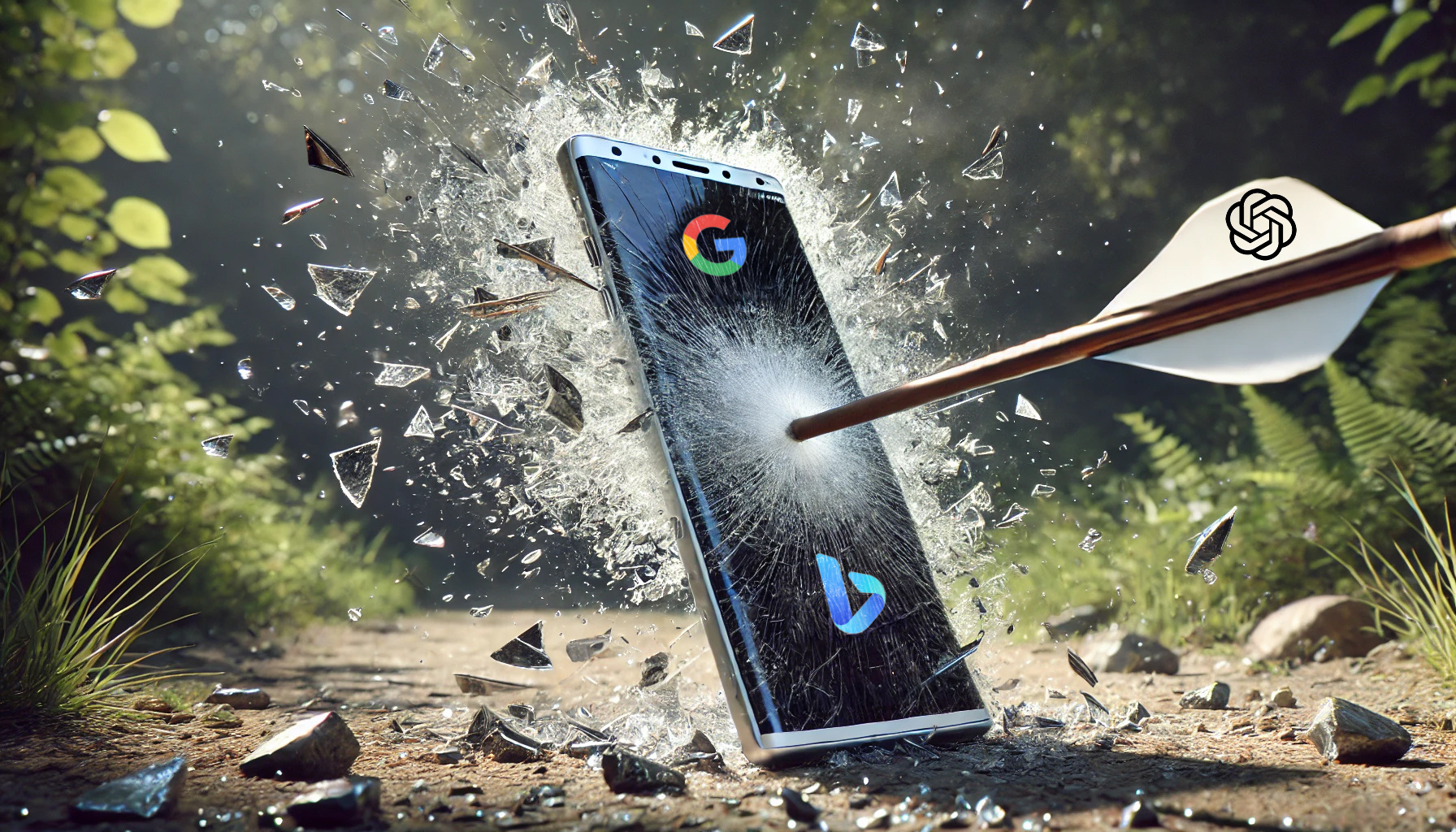SEO is dead… Blah blah blah… We’ve heard it all before.
I’m not saying you’re wrong. I’m saying it doesn’t matter!
The digital landscape is ever-evolving, and with the rise of artificial intelligence like ChatGPT, there's a new narrative making the rounds:
"SEO is dead. Content marketing, blogs, publishing - none of it matters anymore because people are moving to ChatGPT"
It's a bold claim, one that has marketers and content creators alike questioning the future of their craft. Nothing more wrong!
Let me tell you why this line of thinking is not just premature but fundamentally flawed.
The Age-Old Cry: "SEO is Dead"
The proclamation that SEO is dead is not new. It's a refrain that surfaces every few years, usually in response to significant technological or consumer behaviour changes. Remember when social media was supposed to kill email marketing? Or when mobile apps were going to make websites obsolete? History has shown us that while the tools and platforms may change, the foundational strategies remain relevant.
The latest supposed harbinger of doom is ChatGPT, OpenAI's language model that has captured the imagination of millions. Its ability to generate human-like text has led some to believe that traditional search engines and the strategies that optimise for them are on their way out.
Misconception: Content Creation No Longer Matters
The argument goes like this: As AI models like ChatGPT become more advanced, people will turn to them for answers instead of using search engines like Google. Consequently, the need for SEO, content marketing, and blogging will diminish. After all, if an AI can provide immediate answers, what's the point of creating content that's optimised for search engines?
This line of thinking overlooks several critical factors that not only keep content creation relevant but make it more important than ever.
1. Users Still Seek Responses - The Medium May Change, But the Need Doesn't
Whether someone types a query into Google or poses a question to ChatGPT, the fundamental desire is the same: to find an answer or solution to a problem. The medium through which they seek this information may evolve, but the underlying need remains constant.
Search vs. Answer
Traditional search engines provide a list of links that may contain the answer, requiring users to sift through content to find what they're looking for. AI models aim to deliver immediate answers, summarising information from various sources.
But here's the kicker:
“The quality of the AI's response is only as good as the data it has access to...”
2. AI Models Rely on Internet Content
Where do you think AI models like ChatGPT get their information? They are trained on vast amounts of data from the internet, including articles, blogs, research papers, and more. The richness and accuracy of their responses depend on the quality and diversity of the content available online.
The Internet as a Data Source
AI doesn't generate knowledge out of thin air. It processes and learns from existing content. If content creation were to halt, the development of AI models would stagnate. They would have no new information to learn, making their responses outdated and less valuable.
The Feedback Loop
There's a symbiotic relationship here. Content creators produce material that AI models learn from, and in turn, these AI models can help disseminate that content to a broader audience. It's a feedback loop that benefits both parties.
3. If You're Not Publishing Online, You Remain Invisible
Let's suppose you stop creating content because you believe AI will render it obsolete. What happens then? Your brand, ideas, and solutions become invisible to search engines and AI models that could have included your insights in their responses.
Discoverability Matters
In the digital age, visibility is everything. You need to actively contribute content to the internet to show up in search results or in AI-generated answers. Both rely on indexing and processing available online content.
Authority and Trust
Publishing quality content establishes you as an authority in your field. This helps with SEO and signals to AI models that your content is credible and worth including in responses. With a robust online presence, you can build that authority.
4. Quality Content Remains King
This isn't just motivational fluff, it's actionable advice rooted in the realities of how information is consumed and disseminated today.
"Go on then, hit publish on that blog. You’ll thank me later :) "
Human Touch and Expertise
AI models are powerful but lack the human touch that comes from personal experience, anecdotes, and nuanced understanding. Quality content created by humans resonates in ways AI-generated text often can't.
Adaptability
Content creators can adapt to emerging trends, address new concerns, and provide timely insights. This agility is something that AI models, which require time-consuming training on new data, can't match in real-time.
ChatGPT Surpasses Bing's Traffic: Should You Care?
The news that ChatGPT has surpassed Bing in traffic has fueled the narrative that traditional search is dying. But let's put this into perspective.

source: https://www.similarweb.com/blog/insights/ai-news/chatgpt-bing-duckduckgo/
So we can see that ChatGPT (chat.openai.com) compared to challenger (..to Google) search engines, including Baidu, Yandex, Bing, and DuckDuckGo, from November 2022 to March 2023. While Baidu and Yandex maintain higher traffic levels, ChatGPT sees steady growth, surpassing Bing's visits by March 2023. This trend highlights ChatGPT's rising popularity, sparking discussions about the relevance of traditional search engines in a rapidly changing digital landscape.
"So ChatGPT surpassed Bing’s traffic and everyone’s getting their you-know-whats in a twist about it."
Understanding the Numbers
First, surpassing Bing's traffic is noteworthy but not earth-shattering. Bing holds a small fraction of the search engine market share compared to Google. ChatGPT's rise indicates growing interest in AI but doesn't spell doom for search engines.
Different Tools for Different Needs
People use ChatGPT and search engines for different purposes. ChatGPT excels at generating human-like text, brainstorming ideas, or providing quick explanations. Search engines are better suited for finding specific information, accessing up-to-date news, or exploring a range of resources.
Ignore the Hype and Focus on What Matters
The panic around AI replacing search and rendering content creation obsolete is overblown. Here's why you should stay the course.
Market Evolution Is Not Elimination
The emergence of new technologies doesn't necessarily eliminate existing ones. Instead, it often leads to market evolution, where different tools serve different needs.
Diversification of Platforms
Rather than seeing AI as a threat, consider it another platform to distribute your content. Just as you optimise content for search engines, you can feel how AI models might utilise your content.
The Ongoing Importance of SEO and Content Marketing
While the tools and algorithms may change, the core principles of SEO and content marketing remain vital.
User Experience Is Paramount
Search engines and AI models alike prioritise content that offers value to users. By focusing on creating high-quality, user-centric content, you're not just optimising for algorithms, you're building relationships with real people.
“..you're not just optimising for algorithms, you're building relationships with real people..”
Keywords and Context
Understanding what your audience is searching for allows you to create content that meets their needs. This isn't about gaming the system but about effective communication.
Embracing AI as a Complementary Tool
“Rather than viewing AI as the enemy, consider how it can complement your content strategy...”
Content Ideation
AI tools can help generate topic ideas, headlines, or even first drafts, which you can then refine and personalise.
Enhanced Reach
As AI models include your content in their training data, they can help amplify your reach, introducing your ideas to a broader audience.
Actionable Steps Moving Forward
-
Continue Producing Quality Content
Your content is the foundation for both search engines and AI models. Keep creating informative, engaging, and valuable material to your audience.
-
Optimise for Humans First
While it's essential to consider SEO best practices, prioritise the human experience. Content that resonates with readers will naturally perform better across platforms.
-
Stay Informed About AI Trends
Understanding how AI models work can help you adapt your content strategy. For example, clear and well-structured content is more easily processed by AI, increasing the chances of your material being included in AI-generated responses.
-
Diversify Your Content Distribution
Don't rely solely on one platform or medium. Explore various channels like social media, podcasts, video content, and, yes, even AI platforms.
-
Engage with Your Audience
Build a community around your content. Engagement leads to loyalty, and loyal audiences are less likely to be swayed by new platforms or technologies.
Keep Producing and Publishing Quality Content
The rise of AI and models like ChatGPT is an exciting development in the digital landscape, but more is needed to signal the end of SEO, content marketing, or blogging. If anything, it underscores the importance of high-quality content.
By continuing to produce and publish valuable content, you're serving your current audience and contributing to the broader pool of knowledge that powers the next generation of AI models.
Change is the only constant in the digital world. Technologies will evolve, and platforms will rise and fall, but the human need for information, connection, and value remains steady. By focusing on creating content that meets these needs, you position yourself and your brand for long-term success, regardless of the latest trends or technological shifts.





